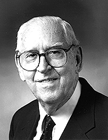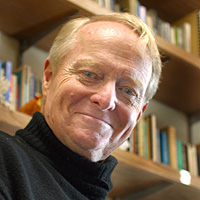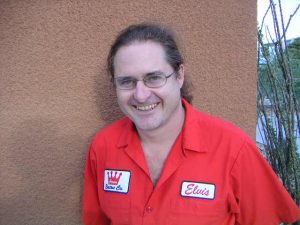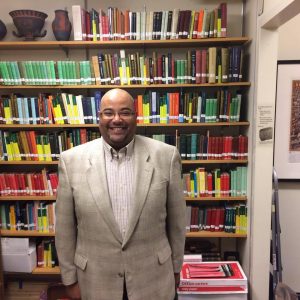The Role of the FPC and its Founders
 The Foundation for the Philosophy of Creativity and its affiliated Societies for the Philosophy of Creativity were founded by a group of scholars interested in the mysterious and fundamental character of creativity. Since the idea of creativity arose as a fundamental question in the philosophies of Bergson, Whitehead, Henry Nelson Wieman, and numerous others who have been labeled “process philosophers,” the FPC and its societies often engage that tradition. However, as conceived by William S. Minor (pictured left), the founder and long-time leader of the group, “creativity” should be studied with every method we possess, and our research should be open, pluralistic, and forward-looking.
The Foundation for the Philosophy of Creativity and its affiliated Societies for the Philosophy of Creativity were founded by a group of scholars interested in the mysterious and fundamental character of creativity. Since the idea of creativity arose as a fundamental question in the philosophies of Bergson, Whitehead, Henry Nelson Wieman, and numerous others who have been labeled “process philosophers,” the FPC and its societies often engage that tradition. However, as conceived by William S. Minor (pictured left), the founder and long-time leader of the group, “creativity” should be studied with every method we possess, and our research should be open, pluralistic, and forward-looking.
Thus, FPC has undertaken many kinds of programs and supported many forms of research over the last six decades. It has organized meetings regularly at the Eastern and Central Division meetings of the American Philosophical Association for its full history, with active Societies for the Philosophy of Creativity affiliated with each division. FPC has organized sessions at the Southern Society for Philosophy and Psychology, the Society for the Advancement of American Philosophy, and at numerous gatherings sponsored by the Center for Process Studies. FPC is part of the International Process Network. In 2002 the FPC sponsored a major conference, Frontiers of Creativity, as Southern Illinois University Carbondale.
The FPC has also been responsibility for a number of publications, including volumes on creativity in the thought of Geirge Herbert Mead, Henry Nelson Wieman, Charles Harsthorne, and Paul Tillich. The papers and records of hundreds of lectures and talks are held in Special Collections of the Morris Library of Southern Illinois University Carbondale.
In 2012, the FPC began a periodic lecture series, named in honor of its long-time member and officer Lewis S. Hahn. This series was expanded into a mini-conference beginning in 2018. Also beginning in 2018 is the FPC Dissertation Fellowship to promote dissertation work in the area of creativity. Both of these programs are undertaken in coordination with the American Institute of Philosophical and Cultural Thought, Murphysboro, Illinois.
Bill Minor wrote a history of the organization in 1983, which is available here.
 Lewis Edwin Hahn, 1908-2004. Lewis Hahn was raised in west Texas, took his Ph.D. at the University of California, Berkeley, in 1939, under the direction of Stephen Pepper. He had a full and successful career in the Philosophy Department of Washington University in St. Louis, being recruited to Southern Illinois University Carbondale in 1973. He was author of several books and many articles and was especially distinguished by his efforts in comparative philosophy and inter-cultural philosophical and religious dialogue. From 1981 until 2001 he edited the prestigious Library of Living Philosophers. He served the Societies and the Foundation for the Philosophy of Creativity, in several offices and principally as its Secretary/Treasurer, from its founding in 1957 until his retirement from active service in the profession in 2001. Lewis Hahn Memorial Lecture is a periodic summertime lecture sponsored by the FPC.
Lewis Edwin Hahn, 1908-2004. Lewis Hahn was raised in west Texas, took his Ph.D. at the University of California, Berkeley, in 1939, under the direction of Stephen Pepper. He had a full and successful career in the Philosophy Department of Washington University in St. Louis, being recruited to Southern Illinois University Carbondale in 1973. He was author of several books and many articles and was especially distinguished by his efforts in comparative philosophy and inter-cultural philosophical and religious dialogue. From 1981 until 2001 he edited the prestigious Library of Living Philosophers. He served the Societies and the Foundation for the Philosophy of Creativity, in several offices and principally as its Secretary/Treasurer, from its founding in 1957 until his retirement from active service in the profession in 2001. Lewis Hahn Memorial Lecture is a periodic summertime lecture sponsored by the FPC.

Dr. Pete (A.Y.) Gunter (1936-2024) was among the founding members of the Foundation of the Philosophy of Creativity. He was Chair of the Board for as long as anyone can remember. He also founded the philosophy department at North Texas State University (now the University of North Texas) in 1969. With Max Oelschlaeger he transformed the department there in 1986 into the nation’s first program in environmental philosophy. His books include Bergson and the Evolution of Physics (1969), The Big Thicket: A Challenge for Conservation (1972), Bergson and Modern Thought (1986), The Big Thicket: An Ecological Reconsideration (1986), Henri Bergson: A Bibliography (1974, 1986, now updated in Presses Universitaires de France online), Texas Land Ethics (1997), and Finding the Big Thicket: A Cartographic Approach (2016), and Getting Bergson Straight (2021). Professor Gunter was instrumental in the creation and enlargement of the Big Thicker National Preserve, the first biological preserve in the history of the National Park Service and the first use stream corridors as fundamental to a park’s structure. He wrote novels and was sometimes caught composing music.
The Foundation Board

Dave Beisecker, Executive Director, is Associate Professor of Philosophy at the University of Nevada, Las Vegas. Dave served a full term as chair of Philosophy at UNLV between 2011 and 2017. His Ph.D. came from the University of Pittsburgh (1999) where he wrote a dissertation directed by Robert Brandom and developed an almost unnatural attachment to the philosophy of Wilfrid Sellars. He was among the group that founded the Sellars Society some years back. His long-term project on logic without appeals to truth functions and conditions is among the most provocative in philosophical logic today, employing a significant development of Peirce’s logic to loosen the borders of the region between thought, talk, and consciousness. His recent research has been uncovering the historical details and the ideas of early American Hegelians, noth the St. Louis group and the Cincinnati group.
 Dr. Larry R. Cobb was an undergraduate student at West Virginia University, where he studied with William S. Minor, majoring in liberal arts with an emphasis in economics. In 1961 he went to SIU Carbondale studying both philosophy and government (two MA degrees in 1963). He returned to SIU in 1965, taking a fellowship at the Center for Dewey Studies and completed the Ph.D. in government in 1967. He took a position at Slippery Rock University where he taught from 1967 until his retirement in 1997. Along the way, Larry taught at Mary Baldwin College, the Governors School of Virginia, and at Allegheny College during various summers. He furthered his studies at UC Berkeley and University of Illinois Urbana Champagne. He served as Chair of the Board of Ethics Works (founded by William S. Minor) from from 1989 until 2009. He became Executive Director of the Foundation for the Philosophy of Creativity in 1989 until 2015 and remains on the Board of the organization. Since 1999 he has worked as a consultant Ethics Works Inc., advising housing directors and training executives and boards for ethical leadership. He created a curriculum still in use for the National Association for Housing and Redevelopment, and various government agencies. He retired to Cape Canaveral, Florida in 2011, and now lives with his spouse in Melbourne, Florida.
Dr. Larry R. Cobb was an undergraduate student at West Virginia University, where he studied with William S. Minor, majoring in liberal arts with an emphasis in economics. In 1961 he went to SIU Carbondale studying both philosophy and government (two MA degrees in 1963). He returned to SIU in 1965, taking a fellowship at the Center for Dewey Studies and completed the Ph.D. in government in 1967. He took a position at Slippery Rock University where he taught from 1967 until his retirement in 1997. Along the way, Larry taught at Mary Baldwin College, the Governors School of Virginia, and at Allegheny College during various summers. He furthered his studies at UC Berkeley and University of Illinois Urbana Champagne. He served as Chair of the Board of Ethics Works (founded by William S. Minor) from from 1989 until 2009. He became Executive Director of the Foundation for the Philosophy of Creativity in 1989 until 2015 and remains on the Board of the organization. Since 1999 he has worked as a consultant Ethics Works Inc., advising housing directors and training executives and boards for ethical leadership. He created a curriculum still in use for the National Association for Housing and Redevelopment, and various government agencies. He retired to Cape Canaveral, Florida in 2011, and now lives with his spouse in Melbourne, Florida.
 Dr. Corey McCall Dr. Corey McCall taught philosophy for a number of years at Elmira College in upstate New York. He is currently a Visiting Scholar in the Department of Literatures in English at Cornell and an instructor for the Cornell Prison Education Program. He has published widely on figures in Continental and American philosophical traditions and his current research focuses on issues in aesthetics, ethics, and the philosophy of race. His recent work includes the co-edited volumes Melville Among the Philosophers (2017) and Benjamin, Adorno, and the Experience of Literature (2018), and a volume co-edited with Philip McReynolds, Decolonizing American Philosophy (SUNY, 2021). Dr. McCall was Executive Director of the FPC from 2015-2023.
Dr. Corey McCall Dr. Corey McCall taught philosophy for a number of years at Elmira College in upstate New York. He is currently a Visiting Scholar in the Department of Literatures in English at Cornell and an instructor for the Cornell Prison Education Program. He has published widely on figures in Continental and American philosophical traditions and his current research focuses on issues in aesthetics, ethics, and the philosophy of race. His recent work includes the co-edited volumes Melville Among the Philosophers (2017) and Benjamin, Adorno, and the Experience of Literature (2018), and a volume co-edited with Philip McReynolds, Decolonizing American Philosophy (SUNY, 2021). Dr. McCall was Executive Director of the FPC from 2015-2023.
 Dr. Randall E. Auxier is a professor of philosophy and communication studies at Southern Illinois University, Carbondale. He is the editor of the Library of Living Philosophers. He edited the journal The Personalist Forum 1997-2006, when he and John Shook transformed it into The Pluralist, and he remained Editor in Chief until 2012. Dr. Auxier authored Time, Will and Purpose (2013), Metaphysical Graffiti (2017), As Deep as It Gets: Movies and Metaphysics (2022), and Logic: From Images to Digits (2022). He co-authored with Gary L. Herstein The Quantum of Explanation: Whitehead’s Radical Empiricism (2017). His edited and co-edited volumes include God, Process and Persons (2000), Critical Responses to Royce (2000), Bruce Springsteen and Philosophy (2006), The Wizard of Oz and Philosophy (2008), and Tom Petty and Philosophy (2019), Rorty and Beyond (2020), and Queen and Philosophy (2023). He and John Shook oversee the American Philosophical and Cultural Thought book series, State University of New York Press.
Dr. Randall E. Auxier is a professor of philosophy and communication studies at Southern Illinois University, Carbondale. He is the editor of the Library of Living Philosophers. He edited the journal The Personalist Forum 1997-2006, when he and John Shook transformed it into The Pluralist, and he remained Editor in Chief until 2012. Dr. Auxier authored Time, Will and Purpose (2013), Metaphysical Graffiti (2017), As Deep as It Gets: Movies and Metaphysics (2022), and Logic: From Images to Digits (2022). He co-authored with Gary L. Herstein The Quantum of Explanation: Whitehead’s Radical Empiricism (2017). His edited and co-edited volumes include God, Process and Persons (2000), Critical Responses to Royce (2000), Bruce Springsteen and Philosophy (2006), The Wizard of Oz and Philosophy (2008), and Tom Petty and Philosophy (2019), Rorty and Beyond (2020), and Queen and Philosophy (2023). He and John Shook oversee the American Philosophical and Cultural Thought book series, State University of New York Press.
 Dr. Myron M. Jackson is Assistant Professor of Philosophy and Religious Studies at Western Carolina University. He previously held the Besl Chair of Ethics, Religion, and Society at Xavier University in Cincinnati, and also taught at Grand Valley State University in Michigan. He specializes in process and continental philosophical traditions, philosophy of culture, and philosophical anthropology. He holds a B.A. and M.A. in Political Science and an M.A. and Ph.D. in Philosophy from Southern Illinois University Carbondale. His current research focuses on ironic relations at the heart of American exceptionalism, along with the influence of European pragmatism in the works of Peter Sloterdijk and Bruno Latour. He was resident fellow for the summer of 2021, May 15 to August 1. He has given two AIPCT lectures here and here.
Dr. Myron M. Jackson is Assistant Professor of Philosophy and Religious Studies at Western Carolina University. He previously held the Besl Chair of Ethics, Religion, and Society at Xavier University in Cincinnati, and also taught at Grand Valley State University in Michigan. He specializes in process and continental philosophical traditions, philosophy of culture, and philosophical anthropology. He holds a B.A. and M.A. in Political Science and an M.A. and Ph.D. in Philosophy from Southern Illinois University Carbondale. His current research focuses on ironic relations at the heart of American exceptionalism, along with the influence of European pragmatism in the works of Peter Sloterdijk and Bruno Latour. He was resident fellow for the summer of 2021, May 15 to August 1. He has given two AIPCT lectures here and here.



